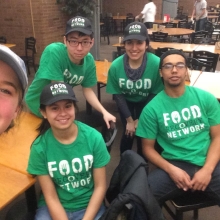Student Sustainability Clubs
Cornell has over 40+ clubs for students at all levels related to sustainability. From environmental justice to thrifting, food waste to beekeeping, sustainable business, project teams, and more, there is something for everyone. No matter what your passion - you can find it here.
Check out Campus Groups for a current listing all Sustainability and Environmental clubs. You can also look for groups focused on Animals and Wildlife, Social Justice, Community Service, Health and Wellbeing, and more.

